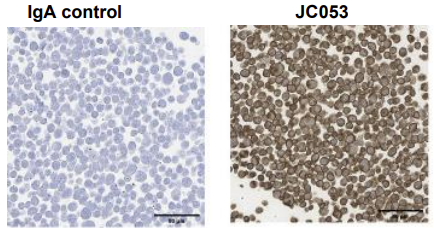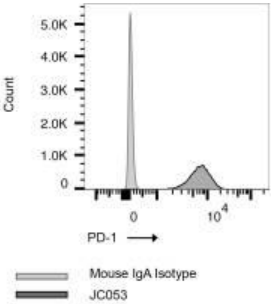Anti-Canine PD-1
Anti-Canine PD-1
Product No.: 34090
- -
- -
Clone JC053 Target PD-1 Formats AvailableView All Product Type Monoclonal Alternate Names Programmed Death-1, CD279, PD1, PDCD1 Isotype Mouse IgA Applications FACS , IHC , Inhibition |
Data
 Immunohistochemistry
ImmunohistochemistryCHO-PD1 cells fixed with 10% neutral buffered formalin, prepared in Histogel and embedded in paraffin, antigen retrieval in citrate buffer at pH 6. Cells stained with IgA isotype control or with JC053.
Courtesy of Dr. JW Choi, University of California, Davis
 Immunohistochemistry
ImmunohistochemistryFormalin-fixed, paraffin-embedded canine tonsil and lymph node stained with IgA isotype control or with JC053.
Courtesy of Dr. JW Choi, University of California, Davis
 Flow Cytometry
Flow CytometryDetection of PD-1 expression on CLGL-90 cells (Chronic Large Granular Lymphocytic-90) stained with JC053 (dark gray) vs. mouse IgA isotype control (light gray).
Courtesy of Dr. JW Choi, University of California, Davis
 Inhibition of PD-1 and PD-L1 Interaction
Inhibition of PD-1 and PD-L1 InteractionJC053 antibody added to ELISA plates coated with PD-1 followed by the addition of biotinylated PD-L1and streptavidin-HRP. JC053 antibody blocked binding of PD-1 to PD-L1 as compared with binding of PD-1 to PD-L1 in the presence of a non-inhibitory antibody 73H2.
Courtesy of Dr. JW Choi, University of California, Davis
- -
- -
Antibody DetailsProduct DetailsReactive Species Canine Host Species Mouse Immunogen Recombinant extracellular domain of canine PD-1 fused with the Fc domain of human IgG1 expressed in D. melanogaster S2 cells. Product Concentration Lot Specific Formulation PBS, pH 7.4. State of Matter Liquid Product Preparation PEG Purified Storage and Handling This antibody is stable for at least one (1) year at -20°C to-70°C. Store in appropriate aliquots to avoid multiple freeze-thaw cycles. Country of Origin USA Shipping Next Day 2-8°C Applications and Recommended Usage? Quality Tested by Leinco Canine PD-1 Monoclonal Antibody Flow cytometry Detection of PD-1 expression on CLGL-90 cells (Chronic Large Granular Lymphocytic-90) stained with JC053 (dark gray) vs. mouse IgA isotype control (light gray). Inhibition of PD-1 and PD-L1 Interaction JC053 antibody added to ELISA plates coated with PD-1 followed by the addition of biotinylated PD-L1and streptavidin-HRP. JC053 antibody blocked binding of PD-1 to PD-L1 as compared with binding of PD-1 to PD-L1 in the presence of a non-inhibitory antibody 73H2.
End users should determine optimal antibody concentrations for their applications. Each investigator should determine their own optimal working dilution for specific applications. See directions on lot specific datasheets, as information may periodically change. DescriptionDescriptionSpecificity Mouse Monoclonal Antibody specific to Canine PD-1 Background Each year, thousands of dogs are diagnosed with cancer. Canine cancers bear many of the
hallmarks of human cancers including tissue location, tumor progression, and response to
chemotherapy and radiation. Unfortunately, canine lymphocyte populations are not as well
defined as human lymphocytes, and reagents that target immune checkpoint pathways are not
yet widely available for veterinary research. Interruption of the programmed death 1 (PD-1) /
programmed death ligand 1 (PD-L1) pathway is an established and effective therapeutic strategy
in human oncology and may be effective for treating canine cancers as well. Antigen Distribution PD-1 is expressed on a subset of CD4-CD8- thymocytes, and on activated T and B cells. Ligand/Receptor PD-L1 (B7-H1), PD-L2 Research Area Apoptosis . Cancer . Cell Biology . Cell Death . Immunology . Inhibitory Molecules . Tumor Suppressors References & CitationsChoi JW et al. 2020 Development of canine PD-1/PD-L1 specific monoclonal antibodies and
amplification of canine T cell function. PLoS One. 2020; 15(7): e0235518. |
Formats Available
 Products are for research use only. Not for use in diagnostic or therapeutic procedures.
Products are for research use only. Not for use in diagnostic or therapeutic procedures.


